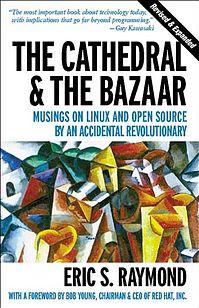 W
WAfter the Software Wars is a book by Keith Curtis about free software and its importance in the computing industry, specifically about its impact on Microsoft and the proprietary software development model.
 W
WThe Cathedral and the Bazaar: Musings on Linux and Open Source by an Accidental Revolutionary is an essay, and later a book, by Eric S. Raymond on software engineering methods, based on his observations of the Linux kernel development process and his experiences managing an open source project, fetchmail. It examines the struggle between top-down and bottom-up design. The essay was first presented by the author at the Linux Kongress on May 27, 1997 in Würzburg (Germany) and was published as part of the book in 1999.
 W
WExtreme programming (XP) is a software development methodology which is intended to improve software quality and responsiveness to changing customer requirements. As a type of agile software development, it advocates frequent "releases" in short development cycles, which is intended to improve productivity and introduce checkpoints at which new customer requirements can be adopted.
 W
WIterative and incremental development is any combination of both iterative design or iterative method and incremental build model for development.
 W
WKanban is a lean method to manage and improve work across human systems. This approach aims to manage work by balancing demands with available capacity, and by improving the handling of system-level bottlenecks.
 W
WA Mayo-Smith pyramid is a triangle divided into a sequence of isosceles trapezoids configured such that the outer perimeter maintains the shape of a triangle with each additional element. A Mayo-Smith pyramid is used to describe system development methodologies adapted for scenarios characterized by schedule and resource uncertainty.
 W
WPlanning poker, also called Scrum poker, is a consensus-based, gamified technique for estimating, mostly used to estimate effort or relative size of development goals in software development. In planning poker, members of the group make estimates by playing numbered cards face-down to the table, instead of speaking them aloud. The cards are revealed, and the estimates are then discussed. By hiding the figures in this way, the group can avoid the cognitive bias of anchoring, where the first number spoken aloud sets a precedent for subsequent estimates.
 W
WThe Unix philosophy, originated by Ken Thompson, is a set of cultural norms and philosophical approaches to minimalist, modular software development. It is based on the experience of leading developers of the Unix operating system. Early Unix developers were important in bringing the concepts of modularity and reusability into software engineering practice, spawning a "software tools" movement. Over time, the leading developers of Unix established a set of cultural norms for developing software; these norms became as important and influential as the technology of Unix itself; this has been termed the "Unix philosophy."
 W
WThe waterfall model is a breakdown of project activities into linear sequential phases, where each phase depends on the deliverables of the previous one and corresponds to a specialization of tasks. The approach is typical for certain areas of engineering design. In software development, it tends to be among the less iterative and flexible approaches, as progress flows in largely one direction through the phases of conception, initiation, analysis, design, construction, testing, deployment and maintenance.